By CNN's National Security Unit
The final debate of the presidential election was notable for all the
areas of foreign policy on which the two candidates seemed to agree.
But in their answers were plenty of unanswered questions about how they
would handle key foreign policy issues going forward.
Where do things stand on Iran?
It was hard to see concrete differences between the candidates Monday
on when it will be necessary to use military force against Iran's
nuclear program - the so-called "red line."
Both President Barack Obama and Mitt Romney sought to portray
themselves as tough on Iran and as having Israel's back. Both suggested
they would be willing to use military power if necessary to stop Iran
from getting a nuclear weapon. But neither was exactly clear about what
point at which they would act to prevent that from happening.
Israeli Prime Minister Benjamin Netanyahu has said the red line should
be preventing Iran's "breakout capacity," meaning the point at which
Iran has enough uranium enrichment for a nuclear weapon and the
technology and know-how to fit a nuclear warhead on a delivery system,
such as a long-range missile.
During the debate, Obama repeated his campaign pledge merely to prevent Iran from acquiring a nuclear bomb.
"As long as I'm president of the United States, Iran will not get a nuclear weapon," Obama said Monday night.
Until now, the Obama administration has suggested its red line was a
strategic decision by the Iranian regime to build a nuclear weapon and
the move to build one. That position has caused tension with Netanyahu,
who feels Obama has not sent clear enough warnings to Tehran.
But on Monday, the president injected some new language into his
refrain, saying American intelligence cooperation with Israel and other
countries would give Washington "a sense of when (Iran) would get
breakout capacity."
"Which means we would not be able to intervene in time to stop their nuclear program," Obama said.
So did the president move up the benchmark up during Monday's debate?
He never did finish the thought and say either what he meant by
breakout or whether he would stop it.
An administration official said Tuesday that the president's red line has not changed.
"We will prevent Iran from getting a nuclear weapon, the official
said. The president's point "is that because of intelligence
capabilities and IAEA efforts, we have a sense of their timeline."
Romney's position has been closer to Netanyahu, saying he would stop
Iran from having break-out capacity. On Monday, he split the difference,
moving closer to Obama's position.
Failing to raise the ambiguous question of the red line, Romney
threatened military action if Iran developed "nuclear-weapons
capability."
But it's far from clear what Romney means here: Enough uranium to
build a weapon - which could take a matter of a few months –or the means
to quickly assembly and deploy a nuclear warhead atop a missile?
Earlier this year, U.S. Defense Secretary Leon Panetta said it would
take two to three years for Iran to produce a bomb and have a
deliverable weapon on a missile.
The vagueness with which both candidates answered the question of
when to take out Iran's nuclear program left more questions than
answers.
– By Elise Labott
What's the plan to deal with Syria?
The debate focused for a few minutes on the plan for Syria. But the
difference between the two candidates was negligible at best. The real
question is does either have a true plan for stopping the violence by
the regime of Bashar al-Assad?
Obama laid out his plan, which for the moment involves aiding the opposition but not intervening directly.
"We are going to do everything we can to make sure that we are
helping the opposition," the president said. "But we also have to
recognize that, you know, for us to get more entangled militarily in
Syria is a serious step, and we have to do so making absolutely certain
that we know who we are helping; that we're not putting arms in the
hands of folks who eventually could turn them against us or allies in
the region."
Romney, for his part, seemed to have the same plan.
"The right course for us, is working through our partners and with
our own resources, to identify responsible parties within Syria,
organize them, bring them together in a - in a form of - if not
government, a form of - of - of council that can take the lead in Syria.
And then make sure they have the arms necessary to defend themselves,"
Romney explained. "We do need to make sure that they don't have arms
that get into the - the wrong hands."
Romney insisted "I don't want to have our military involved in Syria.
I don't think there is a necessity to put our military in Syria at this
stage."
Obama was quick to point out the similarities.
"What you just heard Gov. Romney said is he doesn't have different
ideas. And that's because we're doing exactly what we should be doing to
try to promote a moderate Syrian leadership and a - an effective
transition so that we get Assad out. That's the kind of leadership we've
shown. That's the kind of leadership we'll continue to show."
For now, the most meaningful difference between the two has been on
what arms to give Syrian rebels. Romney has called for supplying arms
that could defend against al-Assad tanks and aircraft.
"In Syria, I'll work with our partners to identify and organize those
members of the opposition who share our values and then ensure they
obtain the arms they need to defeat Assad's tanks helicopters and
fighter jets," Romney said in a speech earlier this month.
The Obama administration has been reluctant for even allies in the
region to provide such heavy firepower for fear of who would end up with
the weapons.
– By Adam Levine
What's their approach to the unraveling of the Arab Spring?
For both candidates, the Arab Spring and the forces it unleashed on
the streets of the Middle East and North Africa bear close watching in
the days, weeks and months ahead, they said. But for the president
especially, questions remain over the administration's initial approach
as well as the uncertain future of the movement.
On Tunisia, where cries for political reform from protesters in the
region began, Obama said "my administration stood with them earlier than
just about any country."
But did the administration show its full-fledged support for the protesters as early as Obama asserted?
After a fruit vendor set himself on fire to protest the corruption of
longtime dictator President Zine al-Abidine Ben Ali in December 2011,
it was Secretary of State Hillary Clinton who told Al-Arabiya that "we
are not taking sides" in the protests that had been going on for almost a
month at that point. Clinton added the United States hoped for a
"peaceful resolution," and "I hope the Tunisian government can bring
that about."
It was not until a few days later when Ben Ali had fled Tunisia for
an exile in Saudi Arabia that Obama issued a statement applauding "the
courage and dignity of the Tunisian people."
The abuses and excesses of the Ben Ali family did not go unrecognized
by the administration however. In leaked diplomatic cables made public
by WikiLeaks, the U.S. ambassador warned of widespread corruption in the
North African country.
"By many measures, Tunisia should be a close US ally. But it is not,"
U.S. Ambassador Robert Godec wrote. "The problem is clear. Tunisia has
been ruled by the same president for 22 years."
In a similar vein, Obama said Monday that in Egypt, the United States
"stood on the side of democracy" in the uprising that eventually
overthrew longtime dictator President Hosni Mubarak.
As the protests began in Cairo's Tahrir Square on January 25, and in
the days immediately following, the Obama administration did not
immediately call for Mubarak's stepping down from power.
In an interview with CNN on January 30, Clinton said the United
States stood on the side of a "democratic Egypt that provides both
political and economic rights to its people" but stopped short of
calling for Mubarak to leave power.
And in a phone conversation with Mubarak on February 1, Obama spoke
about an "orderly transition" in Egypt, according to a White House read
out of the call, but did not call for Mubarak to step aside - the mantra
of a majority of the protesters in Tahrir Square at that point.
Ten days later, following a televised address in which Mubarak
announced he would delegate some of his powers but not step down until
later in the year, Obama issued a statement calling on the Egyptian
government to "spell out in clear and unambiguous language the
step-by-step process that will lead to democracy and the representative
government that the Egyptian people seek."
While there was no call for Mubarak to step down in that statement, the longtime Egyptian president did so the next day.
But the path forward for the U.S. role in the region, especially
Egypt, remains unclear. Both candidates recognize the U.S. must work
with Egypt's new government and help develop an economy. But how to do
that, while ensuring the country does not trample the democratic rights
of women and minorities, is unclear.
In the debate, Obama cited U.S. efforts to organize entrepreneurship
conferences to better assist Egyptians with "rebuilding their economy in
a way that's noncorrupt, that's transparent." But just after he said
that, Obama said for America to be "successful in this region, there are
some things that we're going to have to do here at home as well."
After more than a decade at war, Obama said it was time for the
United States to look inward and further develop its own economy. "It's
very hard for us to project leadership around the world when we're not
doing what we need to do here," he said.
For his part, Romney sounded a similar theme as to the future of U.S. engagement with these young democracies.
"But for us to be able to promote those principles of peace requires
us to be strong, and that begins with a strong economy here at home,"
Romney said. "And unfortunately, the economy is not stronger."
– By Jamie Crawford
What do they say about the fiscal cliff?
Defense spending continues to be a major point of contention between
Obama and Romney. But the president left many wondering if he knew
something nobody else did when he flatly declared during the debate that
further cuts "will not happen."
The cuts, an additional $500 billion over 10 years, will go into
effect if a deficit deal cannot be reached. But that's still a matter of
negotiation with Congress. Romney has tried to say that sequestration,
which is what the further cuts are called, is an Obama plan. The
president rightly points out that it is something that Congress agreed
to as a way to force them into making difficult decisions.
"First of all, the sequester is not something that I've proposed. It
is something that Congress has proposed. It will not happen," Obama said
during the debate.
That was surprising in its certainty. Republican's pounced. The
chairman of the House Armed Services Committee e-mailed out a statement
questioning Obama's involvement in trying to head off sequestration.
"It is a nice line, but for more than a year, the president hasn't
lifted a finger to avert the crisis," said the statement from U.S. Rep.
Buck McKeon, R-California. "The president and his party in the Senate
have failed to offer even a single real solution that could resolve
sequestration. If the president is determined that these cuts won't
happen, why has he drug it out this long?"
Obama campaign adviser David Axelrod tried to explain it when Jessica
Yellin, CNN's chief White House correspondent, interviewed him after
the debate.
"Well, he can be sure because when the people vote on November 6 and
the president is re-elected, a strong message will be sent - sent that
the American people want a balanced approach to solving this problem,"
Axelrod said. "There are plenty of people on both sides who want to get
that done."
White House senior adviser David Plouffe told Politico that the
president was merely reflecting the reality that the cuts are something
everyone wants to avoid.
"Listen, you talk to Republicans and Democrats on Capitol Hill. No
one thinks it should happen. It was designed so what the parties have to
do," Plouffe told Politico.
– By Adam Levine
Why was Romney agreeing to agree so often?
Perhaps one of the most surprising aspects of the third and final
debate was Romney's willingness to agree with the president on variety
of topics, further closing the foreign policy gap between the two
candidates and making it more difficult to discern any true difference.
Throughout the debate, Romney agreed to agree with Obama.
But Romney did have some more nuanced positions in areas where he appeared to overall agree with the president.
On Iraq, Romney said his desire to maintain a troop presence after
the U.S. withdrawal was no different than the president's failed efforts
to negotiate an agreement with the Iraq government to leave 3,000 to
5,000 troops in country. However, Romney supported having 10,000 troops
stay in Iraq after the withdrawal.
On Egypt, Romney supported the president's decision to stand with the
pro-democracy protesters and against then-President Hosni Mubarak.
However, Romney said he wished Obama had had a better vision for the
region before the Arab Spring ignited.
"I wish that, looking back at the beginning of the president's term
and even further back than that, that we'd have recognized that there
was a growing energy and passion for freedom in that part of the world,"
said Romney, "and that we would have worked more aggressively with our
friend and with other friends in the region to have them make the
transition towards a more representative form government such that it
didn't explode in the way that it did."
On Israel, Romney and Obama expressed strong support for the Jewish
state. However, Romney took a more strident tone in response to Bob
Schieffer's question: Would either of you be willing to declare that an
attack on Israel is an attack on the United States?
Whereas Obama replied the U.S. would "stand with Israel," Romney
replied, "if Israel is attacked, we have their back, not just
diplomatically, not just culturally, but militarily. That's number one."
On Pakistan, Romney contended the strained relationship between the
United States and Pakistan was a necessary evil when it came to finding
Osama bin Laden, but he noted "there was a great deal of anger even
before that." Romney said the presence of terrorist groups such as the
Haqqani network and the Taliban in Pakistan as well as the stockpile of
nuclear weapons there means "we can't just walk away from Pakistan." But
he said the more than $1 billion in aid the U.S. gives Pakistan "is
going to have to be conditioned upon certain benchmarks being met."
On drones, Romney asserted his support for the president's increased
use of armed unmanned aircraft to kill terrorists. However, the governor
used the question on drones to continue his attack on the president's
strategy in the region, citing tensions with Iran, al Qaeda's resurgent
and growing presence and continued unrest in the Middle East and North
Africa.
"Let me also note that, as I said earlier, we're going to have to do
more than just going after leaders and ... and killing bad guys,
important as that is," said Romney. "We're also going to have to have a
far more effective and comprehensive strategy to help move the world
away from terror and Islamic extremism."
– By Morgan Hitzig
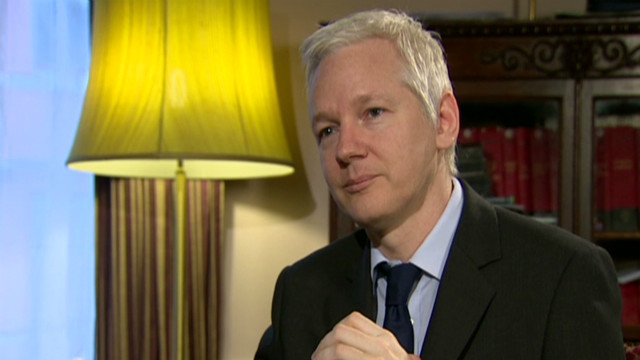



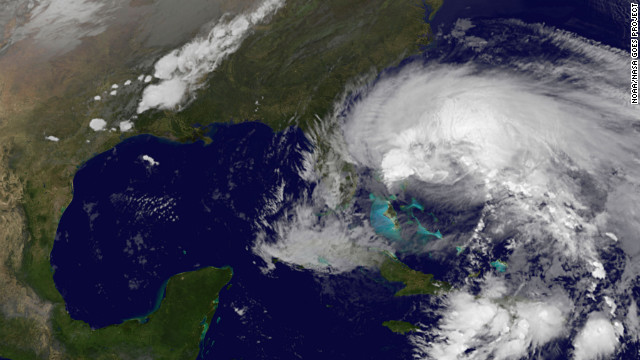
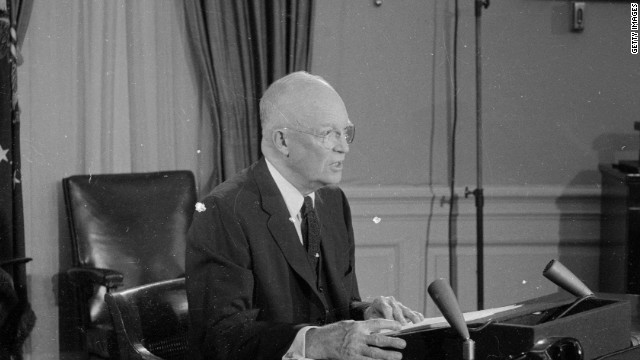
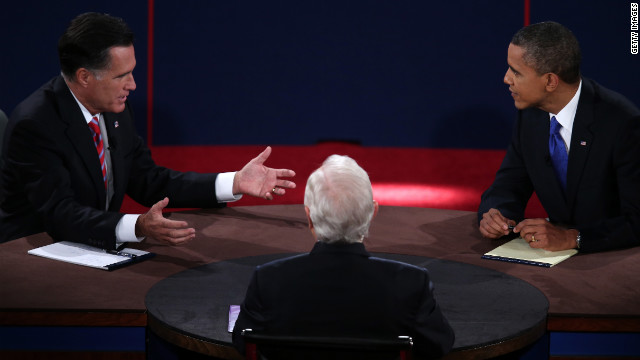
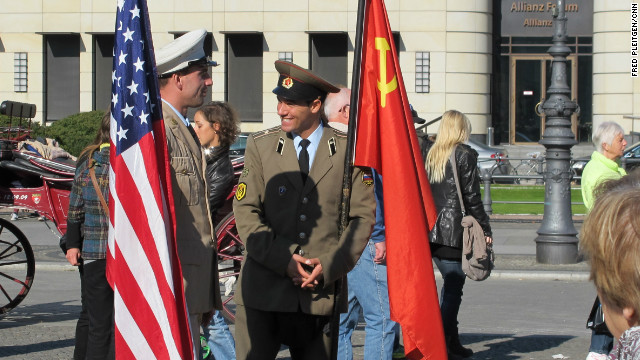 Few European cities have been more
recently affected by the U.S. than Berlin, where America's role in
propping up West Berlin during the Cold War against Soviet Communism
remains in the public conscience.
Few European cities have been more
recently affected by the U.S. than Berlin, where America's role in
propping up West Berlin during the Cold War against Soviet Communism
remains in the public conscience.












